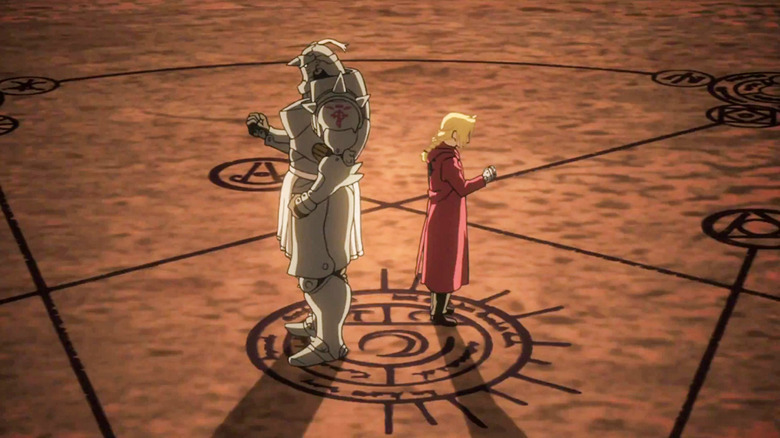
(Welcome to The Daily Stream, an ongoing series in which the /Film team shares what they've been watching, why it's worth checking out, and where you can stream it.)
The Show: "Fullmetal Alchemist: Brotherhood"
Where You Can Stream It: Hulu, Funimation, and Crunchyroll
The Pitch: "Fullmetal Alchemist: Brotherhood" takes place in a world similar to western Europe at the turn of the 20th century, but one in which alchemists drive innovation, not engineers. Two of these alchemists, Edward Elric and his little brother Alphonse, are on a quest. A few years prior, they attempted the ultimate taboo: trying to use alchemy to revive the dead, specifically their mother, Trisha. Instead of resurrecting her, the brothers incurred the wrath of the Truth, a being we mere humans might call by many names (including God). The Elrics paid a heavy toll for their arrogance. Ed lost his left leg, for his mother was his foundation. Al, who wanted to feel the warmth of his mother's love once more, lost his whole body. A desperate Ed then bound Al's soul to a suit of armor, paying with his literal right hand to restore his metaphorical one.
Now, with Ed equipped with "automail" prosthetics and a State Alchemist license, the brothers seek the Philosopher's Stone, a legendary object whose power can bypass alchemy's first principle: equivalent exchange. The Elrics hope to use the stone to restore their bodies. However, their journey becomes a lot more complicated as they learn about dark forces at work in their home country of Amestris.
Why It's Essential Viewing
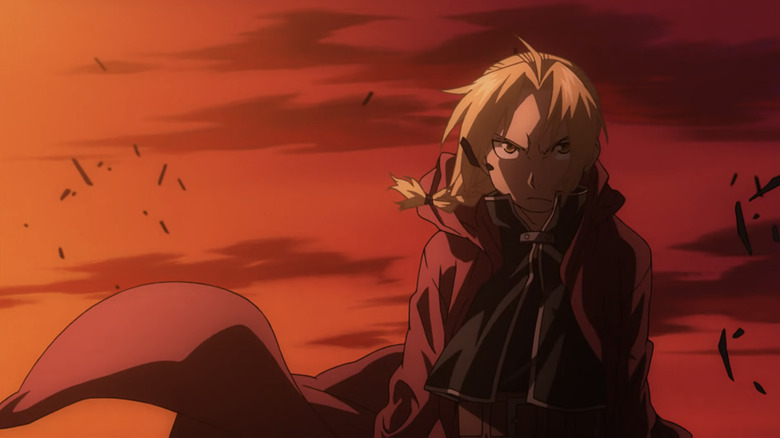
What's the most common complaint you'll hear about anime? Filler. Series go on stretches of a dozen episodes or longer where nothing consequential happens. That's not the case with "Fullmetal Alchemist: Brotherhood." Across its relatively light 64-episode run, the story is always moving with the propulsive speed of a jet engine. You can't stop watching; I, for one, watched the last 13 episodes of the series in one sitting. I couldn't bear not knowing what was going to happen next. If you watch "FMA: Brotherhood," I guarantee you'll feel the same way.
Like much shōnen anime, "Fullmetal Alchemist" began as a manga, written and drawn by Hiromu Arakawa. The art style of "Brotherhood" captures the bouncy and clean simplicity of Arakawa's manga and the action scenes match the energy that bursts off her pages. The additions of color, motion, and sound make the action even more striking, as does character animation so fluid it rivals "Cowboy Bebop." Speaking of the manga, I'm currently on Volume 9. It speaks to how good the story is that I'm never bored, even though I know where it's headed thanks to "Brotherhood."
Character Is FMA's Strength
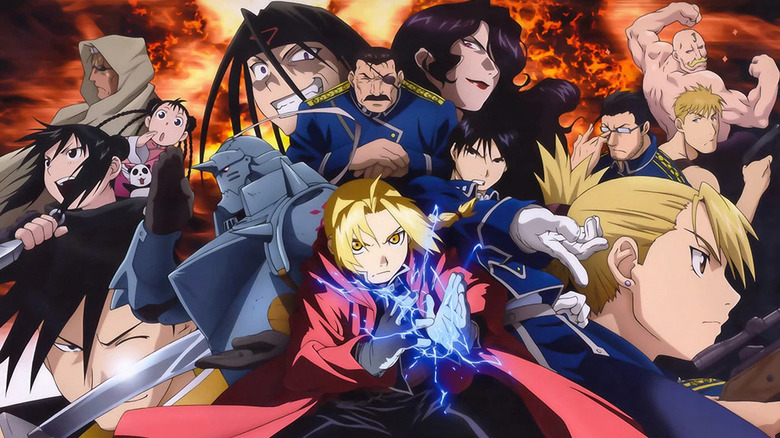
That's not to say "Brotherhood" is style over substance; the action draws you in, but the characters are why you stay. In fantasy stories like this, it's easy for the protagonist to be an unremarkable audience cipher, but that's not the case with Ed or Al. The brothers are both shouldering the guilt of their mutual mistake and are determined to make up for it. Ed's short temper played against Al's peacemaking politeness always makes for great comedy, while their devotion to each other can melt even the coldest hearts.
While the Elrics never get lost among the ensemble, it's not because the supporting cast lacks interesting members. First up is Winry Rockbell, the Elrics' childhood best friend and the "engineering otaku" who maintains Ed's automail limbs. The brothers' main contact in the military is Colonel Roy Mustang, the Flame Alchemist. Mustang is the flat-out coolest character in "Fullmetal Alchemist," but it becomes clear that beneath his charm, ambition, and skirt-chasing, Mustang is harboring guilt for his own past just like the Elrics. While the Elrics are chasing their original bodies, Mustang seeks the leadership of Amestris so he might lead the country to a brighter future.
Helping him on that quest he has his loyal second in command, the stoic and loyal Lieutenant Riza Hawkeye. Though not an alchemist, Hawkeye lives up to her name as a markswoman. I'm not usually one for shipping, but Mustang and Hawkeye's understanding of the other and mutual devotion had me rooting for a kiss that never came.
The Elrics' other primary friend in the military is Major Alex Louis Armstrong; the only thing bigger than his muscles is his personality. Halfway through the series, we also meet his big sister Olivier, the ice queen (in temperament and position) of northern fortress Briggs.
The Rest Of The Supporting Cast
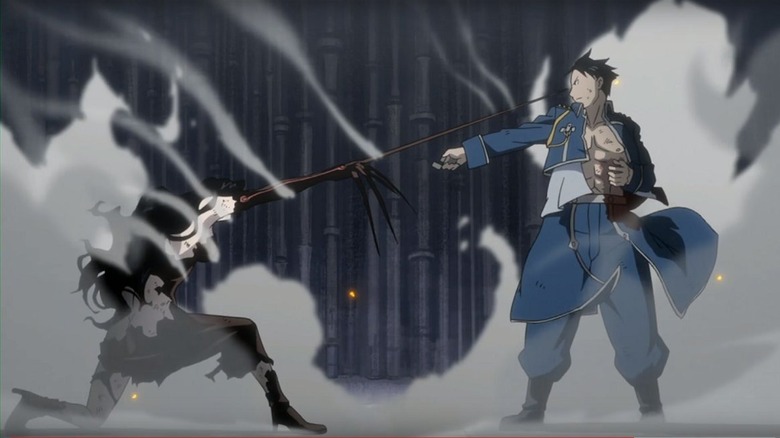
There are more supporting characters in "FMA" beyond those in the military. For one there's Scar, the series' otherwise unnamed antihero. Scar is an Ishvalan, a people massacred by Amestris' military. So now he seeks vengeance on the State Alchemists -- the innocent Ed included.
Scar isn't the only international character. A handful of characters come from the nation Xing, a stand-in for China just as Amestris is for Germany. Prince Ling Yao (plus his bodyguards Lan Fan & Fu) befriends the Elrics, while Princess May Chang joins up with Scar; their friendship helps along his heel face turn.
Back in Amestris, there's Izumi Curtis, the Elrics' wise but temperamental Alchemy teacher. She may insist she's just a housewife, but she's one of the most powerful characters in hand-to-hand combat and alchemy alike. Finally, Van Hohenheim, Ed and Al's enigmatic, absentee father; if I say more about him I'd be giving too much away.
Not all the faces are friendly. One of the more sinister ones belongs to Solf J. Kimblee, the Crimson Alchemist. He has the sadism of a serial killer and the temperament of a philosopher, and his white suit is proof that evil comes in style. Kimblee is far from the most dangerous villain in the series, though.
That title belongs to the Homunculi, seven artificial humans. Among their ranks are Lust the Lascivious, whose talons would make Wolverine blush, Envy the Jealous, a shapeshifter whose truest self is a green-skinned monster, and Pride the Arrogant, a mass of shadows contained in the humble form of a little boy. Noticing a pattern here? Yes, the Homunculi are each created from one of the Seven Deadly Sins. Their Father expelled that which keeps man lower than God from himself. Dissatisfied with humanity, Father seeks to eclipse God as a perfect being.
Anime With Something To Say
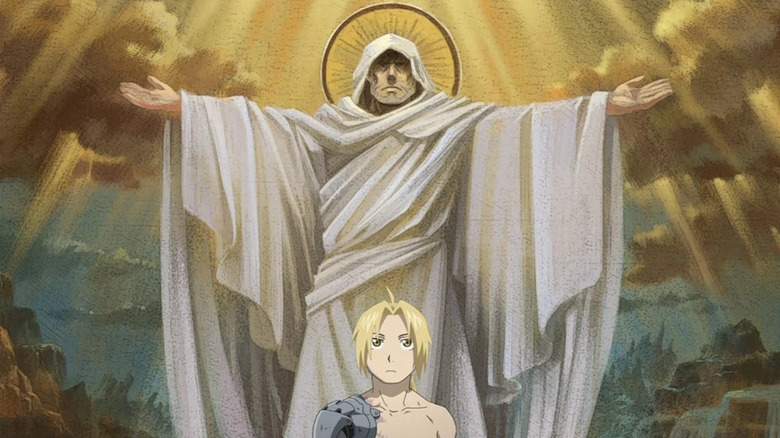
"Fullmetal Alchemist" has more on its mind than the average adventure anime. The series explores the conflict between science and religion, two divergent fields which are bridged only by alchemy. Ed regards alchemy as a science first and foremost, and indeed, the brothers' first foe is a corrupt priest. However, the series ultimately avoids a dichotomous "science good, faith bad" argument.
Part of the sin of human transmutation is how it reduces the worth of a soul to something that can be measured, like the chemical composition of the body or the value of a gold piece. To the Homunculi, human lives are just a resource; they have no more respect for a person's autonomy than the fascist state they rule through Führer Bradley (aka Wrath the Furious) does. Like all empires, the land of Amestris is stained with blood of the oppressed, the leftovers of massacres done in service of Father's plan to take even more lives.
Though filtered through a very anime-flavored "the power of friendship trumps all" coding, these themes of anti-fascism and life's inherent value are potent and relevant. I submit that "Fullmetal Alchemist" is one of the best adaptations of "Frankenstein," another story about the power of creating life and the folly of man attempting to play god.
That said, it's not all dark. "FMA" has plenty of anime humor, with characters screaming as their heads enlarge to comical size; here, your mileage may vary.
The Sound Of Music
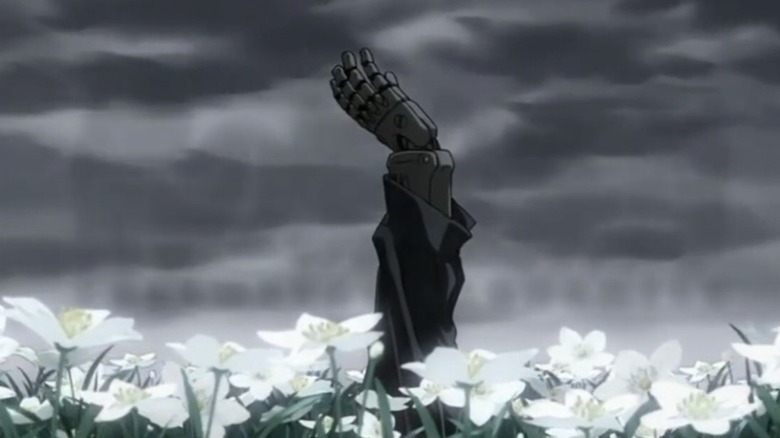
On the more technical side of things, this is an anime that sounds great. I watched it dubbed, where the highlights are Travis Willingham as Roy Mustang, Wendy Powell as Envy, Colleen Clinkenbeard as Riza Hawkeye, Christopher Sabat as Major Armstrong, and the late Ed Blaylock as Führer Bradley/Wrath.
Highlights from Akira Senju's instrumental score are "Lapis Philosophorum," an unsettling chant, the thrilling "Crisis in the North" which accompanies action beats, and "Ante Meridiem," a foreboding composition that plays at key points in the episodes "Eye of Heaven, Gateway Of Earth" and "He Who Would Swallow God." From the placement and creepiness, it can be considered Father's theme. These three just scratch the surface; Senju's score has enough bangers that no one will walk away with identical arrangements of favorites.
Part of the fun of anime is the opening and closing sequences; "Brotherhood" delivers and then some. All ten of these songs are fantastic and unique, but the standouts from each group are "Hologram" by NICO Touches the Walls (which opens Episodes 15-26) and "Shunkan Sentimental" by SCANDAL (which closes Episodes 39-50). The former is an uplifting anthem about moving past obstacles and creating a better world, while the latter is the perfect tune to close each episode while hyping up the next one.
The best juxtaposition between opening and closing themes in "Brotherhood," though, are the final ones. The last stretch of the series opens with the somber, dramatic "Rain" by SID, representing the dark storm descending on our heroes, but closes with "Ray of Light" by Shoko Nakagawa, a soothing song reflecting the soon-to-come happy ending.
We Get The World We Deserve
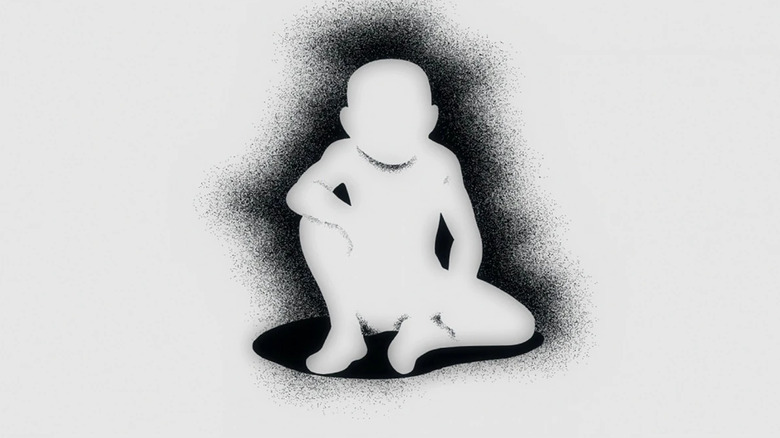
I'm a fan of the 2003 "Fullmetal Alchemist" anime. I'd say that series does some things even better than "Brotherhood." However, I've never been wholly satisfied with its ending, either the TV version or the follow-up film "Conqueror of Shamballa." It leaned too far on the "bitter" side of bittersweet and was inconclusive. "Brotherhood" offers the ending I yearned for.
A principle of alchemy is Equivalent Exchange; you can only gain via sacrifice. It's a worldview shaped by Arakawa's childhood growing up on a farm, and it permeates her writing. All of the Homunculi are overcome in ways befitting their sin. Even Greed the Avaricious, who joined the heroes, gets a positively ironic death, where he achieves satisfaction only through friendship and self-sacrifice. The Elrics, on the other hand, succeed in their quest to restore their bodies, and Ed, who began the series thinking alchemy could defy the most natural law of all, ends the series not with greater power, but contentment in the lessons he's learned and the relationships he's forged. Though the heroes all went through hell, they came away stronger and happier. It's the type of ending we can all only hope to have.
Read this next: The Best Adult Animation Of 2021
The post The Daily Stream: Fullmetal Alchemist: Brotherhood Mixes Unrelenting Excitement With Valuable Lessons appeared first on /Film.
